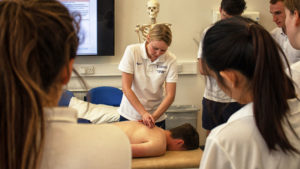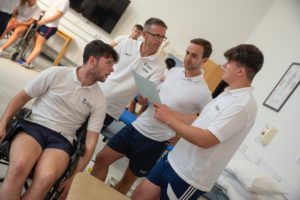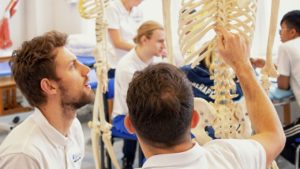Physiotherapy
UCAS code B160
- Study mode
- Full-time
- Duration
- 3 years
- Start date and application deadlines
-
- Start date
- September 2025 September 2026
- Apply by:
- Starts on:
UCAS code B160
We've set the country or region your qualifications are from as United Kingdom.
Our Physiotherapy programme is a modern, thought-provoking programme that enables students to develop the skills and experience to flourish as a physiotherapist in the modern healthcare environment.
A broad range of learning opportunities ensures that learning is accessible to students expressing different learning styles and preferences. Alongside academic and professional skills you will gain an excellent range of practical experience in a wide range of settings. The programme at Liverpool will encourage you to become independent, resourceful and able to meet the exciting challenges of healthcare today.
This programme is designed to reflect current physiotherapy practice with research evidence underpinning all aspects of our teaching.
Alongside academic and professional skills you will gain an excellent range of practical experience in a wide range of settings. The programme at Liverpool will encourage you to become independent, resourceful and able to meet the exciting challenges of healthcare today.
The programme adopts a modular approach to the delivery of content. It incorporates both university taught and practice-based components which have been designed together as an integrated whole.
Key transferable skills are embedded into the curriculum at every level so that individuals are equipped to effectively manage their personal and professional development following graduation.

We’re proud to announce we’ve been awarded a Gold rating for educational excellence.
Discover what you'll learn, what you'll study, and how you'll be taught and assessed.
First year studies provide a foundation to profession specific practical skills and core knowledge, primarily focussing on the structure and function of tissues found within the human body.
During first year, we enable students to develop their independent learning strategies as well as their teamwork, communication and interpersonal skills.
Key themes include:
Programme details and modules listed are illustrative only and subject to change.
In year two, you will continue to grow your skills and knowledge through academic study and practical experience with a particular emphasis placed on pathology.
Key themes include:
Programme details and modules listed are illustrative only and subject to change.
Your final year will be dedicated to the development of advanced skills and techniques, and the ability needed to apply them in practice.
In third year, we will:
Programme details and modules listed are illustrative only and subject to change.
Our curriculum has been designed to reflect current practice with research evidence underpinning all aspects of our teaching.
Learning is promoted through a wide variety of activities that enable students to become autonomous and continuous learners, using a broad range of learning opportunities to allow students to expressing different learning styles and preferences.
Interactive lectures, practical and clinical skills group work, simulation, directed study, role play, problem based learning, small group work, student-led seminars, collaborative project work and interactive tutorials will all prove to be key components of your learning experience.
Practical work using our imaging suite digital equipment, 3D virtual reality radiotherapy facility, Clinical Skills Resource Room and the Human Anatomy Resource Centre complement teaching activities. Face-to-face interactions between all students will occur at shared lectures, tutorials and group work and online interaction will be encouraged and facilitated.
We also encourage inter-professional learning opportunities which mirror the modern, collaborative environments of the modern healthcare industry.
Using a mixture of coursework and examinations, a range of assessment methods are used across this programme. These include seen and unseen written examinations, essay assignments with specific word lengths, multiple choice questions, case study presentations, video analysis and interactive practical examinations.
Assessment of the work-based learning element of all programmes is an important aspect. You will be required to communicate your views orally and in written form; analyse, implement and evaluate your practice; and to extend the research and evidence base of your chosen profession.
The various methods of assessments have been chosen to provide a balance that will permit the undergraduates to properly demonstrate their intellectual abilities in all areas.
We have a distinctive approach to education, the Liverpool Curriculum Framework, which focuses on research-connected teaching, active learning, and authentic assessment to ensure our students graduate as digitally fluent and confident global citizens.
The Liverpool Curriculum framework sets out our distinctive approach to education. Our teaching staff support our students to develop academic knowledge, skills, and understanding alongside our graduate attributes:
Our curriculum is characterised by the three Liverpool Hallmarks:
All this is underpinned by our core value of inclusivity and commitment to providing a curriculum that is accessible to all students.
Studying with us means you can tailor your degree to suit you. Here's what is available on this course.
University of Liverpool students can choose from an exciting range of study placements at partner universities worldwide.
Spend a summer abroad on a study placement or research project at one of our worldwide partner institutions.
Every student at The University of Liverpool can study a language as part of, or alongside their degree. You can choose:
Physiotherapy students benefit from the School of Allied Health Professions and Nursing‘s experience in delivering over 100 years of dynamic, research-led teaching. Our student satisfaction rates, which range from 93-100%, are testament to our School being a great place to start to your career.






From arrival to alumni, we’re with you all the way:

Want to find out more about student life?
Chat with our student ambassadors and ask any questions you have.
A Physiotherapy degree from the University of Liverpool can set you up for a rewarding and challenging career in a diverse range of professional environments. Physiotherapy graduates are eligible to apply for membership of the Health and Care Professions Council (HCPC) and the Chartered Society of Physiotherapy.
Many graduates find employment in the NHS, in industry, private practice, sport, research or teaching.
You will have gained a qualification that meets the Government’s criteria for ‘fitness for purpose’ and ‘fitness for practice’.
There are many employment opportunities for physiotherapists to work in a wide range of clinical settings, from paediatrics to older persons’ care. Your UK qualification also provides an opportunity to work abroad in many countries.
You’ll be taught a curriculum that is developed and assessed by leading healthcare providers, such as:
Many such partners across the North West provide you with exciting placement opportunities.
99% of School of Allied Health Professions and Nursing’s students find their main activity after graduation meaningful.
(Graduate Outcomes, 2018-19.)
My qualifications are from United Kingdom.
Your tuition fees, funding your studies, and other costs to consider.
Full-time place, per year - £9,535
Year abroad fee - £1,430 (applies to year in China)
Full-time place, per year - £29,100
Year abroad fee - £14,550 (applies to year in China)
The tuition fees shown are correct for 2025/26 entry. Please note that the year abroad fee also applies to the year in China.
Tuition fees cover the cost of your teaching and assessment, operating facilities such as libraries, IT equipment, and access to academic and personal support. Learn more about paying for your studies.
We understand that budgeting for your time at university is important, and we want to make sure you understand any course-related costs that are not covered by your tuition fee. This may include a laptop, books, or stationery. Additional costs for this course could include equipment, professional association fees and travel to placements.
Stationery and equipment
Practical kit: £120
Professional association fees
Optional Chartered Society of Physiotherapy Student Membership: £42 per year
Travel to placements
Students will complete 30 weeks of core placement experience. In year one, students undertake a one-week observation placement in the Merseyside area.
All placements are a daily commute, therefore additional accommodation costs are not incurred.
Student concessions are also available from local travel companies.
Elective placements
At the end of year two, students undertake a four-week elective placement, either in the UK or overseas, which is self-funded.
* Home students are able to apply for reimbursement of travel/accommodation costs in relation to placement from the NHS Business Services Authority.
We offer a range of scholarships and bursaries that could help pay your tuition and living expenses.
If you’re a UK student joining an undergraduate degree and have a household income below £35,000, you could be eligible for a Liverpool Bursary worth up to £2,000 for each year of undergraduate study.
If you’ve spent 13 or more weeks in Local Authority care since age 14, you could be eligible for a bursary of £3,000 per year of study. You’ll need to be a UK student joining an eligible undergraduate degree and be aged 28 or above on 1 September in the year you start.
Are you a UK student with a Black African or Caribbean heritage and a household income of £25,000 or less? You could be eligible to apply for a Cowrie Foundation Scholarship worth up to £8,000 for each year of undergraduate study.
If you’re a UK student identified as estranged by Student Finance England (or the equivalent UK funding body), you could be eligible for a bursary of £1,000 for each year of undergraduate study.
Joining a School of Biosciences degree and have a household income of less than £25,000? If you’re a UK student, you could apply to receive £4,500 per year for three years of your undergraduate course.
Do you live in the Liverpool City Region with a household income of £25,000 or less? Did neither of your parents attend University? You could be eligible to apply for a Nolan Scholarship worth £5,000 per year for three years of undergraduate study.
Are you a UK student with a household income of £25,000 or less? If you’ve participated in an eligible outreach programme, you could be eligible to apply for a Rigby Enterprise Award worth £5,000 per year for three years of your undergraduate degree.
Are you a UK student with a household income of £25,000 or less? Did neither of your parents attend University? You could be eligible to apply for a ROLABOTIC Scholarship worth £4,500 for each year of your undergraduate degree.
Apply to receive tailored training support to enhance your sporting performance. Our athlete support package includes a range of benefits, from bespoke strength and conditioning training to physiotherapy sessions and one-to-one nutritional advice.
Joining a degree in the School of Electrical Engineering, Electronics and Computer Science? If you’re a UK student with household income below £25,000, you could be eligible to apply for £5,000 a year for three years of study. Two awards will be available per academic year.
Joining a Nursing, Occupational Therapy or Physiotherapy degree? If you’re a UK student with a Merseyside connection and a household income below £25,000, you could be eligible to apply for a £2,500 payment for each year of your course. Six awards are available per year.
If you’re a young adult and a registered carer in the UK, you might be eligible for a £1,000 bursary for each year of study. You’ll need to be aged 18-25 on 1 September in the year you start your undergraduate degree.
My qualifications are from United Kingdom.
The qualifications and exam results you'll need to apply for this course.
NHS Values will be assessed in all areas of an application including UCAS Personal Statement and at interview. For more details, please download our explanation of Value Based Recruitment.
| Qualification | Details |
|---|---|
| A levels |
AAB including Biology or PE or Sport Science and the Active Leisure Industry. Applicants with the Extended Project Qualification (EPQ) are eligible for a reduction in grade requirements. For this course, the offer is ABB with A in the EPQ. You may automatically qualify for reduced entry requirements through our contextual offers scheme. Based on your personal circumstances, you may automatically qualify for up to a two-grade reduction in the entry requirements needed for this course. When you apply, we consider a range of factors – such as where you live – to assess if you’re eligible for a grade reduction. You don’t have to make an application for a grade reduction – we’ll do all the work. Find out more about how we make reduced grade offers. If you don't meet the entry requirements, you may be able to complete a foundation year which would allow you to progress to this course. Available foundation years: |
| T levels |
T levels in Health is accepted with an overall grade of D (distinction) to include an A grade in the core. Applicants should contact us by completing the enquiry form on our website to discuss specific requirements in the core components and the occupational specialism. |
| GCSE |
6 GCSE subjects grade A*-B/Level 6 including English Language, Mathematics and two Sciences from the following: Biology, Chemistry, Physics, PE, Core Science, Additional Science and Dual Science. Standalone English Literature is not accepted in lieu of English or English Language at grade B (GSCE). Applied GCSEs will not be considered. |
| Subject requirements | - For applicants from England: Where a science has been taken at A level (Chemistry, Biology or Physics), a pass in the Science practical of each subject will be required. |
| BTEC Level 3 National Extended Diploma | BTEC Nationals are considered in addition to 6 GCSEs grades A* – B or level 6, which must include English Language, Maths and two Science subjects from the following: Biology, Chemistry, Physics, PE, Core Science, Additional Science and Dual Science Award. Please note that Applied GCSEs will not be considered. BTEC National Extended Certificate We will accept one subject at a minimum of Distinction. This must be accompanied by two A2 subjects at grade A and B. The A2 subjects must include Biology, PE or Sport Science and the Active Leisure Industry. In total between the two qualifications, 3 separate subjects must be taken. BTEC National Diploma We will only accept in Sport and Exercise Science at grade DD plus one accompanying A2 subject at grade A. Applicants presenting with a BTEC National Diploma in Health and Social Care will be considered at grade DD and must also have an A level in Biology, PE or Sports Science and the active leisure industry at grade A. Across the two qualifications, two separate subjects must be taken. BTEC National Extended Diploma Will be accepted in Health and Social Care or Sport and Exercise Science at grade DDD. |
| International Baccalaureate | 32 points including 3 Higher Level subjects at a minimum of grades 6,6,5. Biology or ‘Sport, Exercise and Health Science’ must be offered at Higher Level grade 6. |
| Irish Leaving Certificate | Leaving Certificate: 6 Higher Level subjects to be gained at a single sitting including English and Maths. 2 subjects at H1 grade to include either Biology or PE. Plus 3 subjects at H2 grade and one subject at H3 grade. |
| Scottish Higher/Advanced Higher | Advanced Highers: ABB to include Biology or PE. OR Highers: AAABB to include Biology or PE at Grade A. OR Mixed: Advanced Highers at AB, plus Highers at AB. A mixed presentation must include Biology or PE at either Higher Level (Grade A required) or Advanced Higher Level (Grade B required). |
| Welsh Baccalaureate Advanced | Advanced Welsh Baccalaureate: Grades AA at A level including Biology or PE plus an A in the Advanced Skills Challenge Certificate. |
| Cambridge Pre-U Diploma | Will be considered at Grades D3, D3, M1. Must include Biology or PE. |
| AQA Baccalaureate | Will be considered |
| Graduate application | We welcome applications from students holding a 2:1 Honours degree in a Biological, Biomedical, or Health Science subject. Students with a 2:1 Honours degree in a non-science based or un-related subject will be asked for Biology or PE A level at grade B (or the OU SK299 at Pass Grade 2). Applicants must have five GCSEs at a minimum of Grade C (Level 5) to include Maths, English language and Science. |
| Access | Access to HE Diploma (QAA regulated): 60 credits overall including 45 graded Level 3 credits. 15 credits must relate to Biology/Human Physiology. Applicants will be required to achieve at least 39 Distinctions and 6 Merits with all 15 of the Biology/Human Physiology modules passed at Distinction. Applicants must also have 5 GCSEs at a minimum of Grade C (Level 5) including English language, Mathematics and Science (in either Biology, Chemistry or Physics). |
| Academic Reference | An academic reference must be included within the UCAS application. If the applicant is a graduate and has been working since graduating (within three years), an employer reference is acceptable. |
| Profession-specific knowledge and skills required | Candidates must show evidence, in their UCAS Personal Statement, of a good understanding of the scope of physiotherapy practice, preferably indicated by observation experience of Chartered Physiotherapists working in a variety of clinical areas. It is recommended that prospective applicants contact the Physiotherapy Departments at their local hospitals, clinics, day centres and special schools, etc. in order to arrange a visit. Experience in a paid or voluntary capacity working with the general public, children, elderly or people with special needs will also help to strengthen an application. Applicants will be expected to demonstrate some knowledge and understanding of the NHS Core Values as outlined in the NHS constitution. |
| Declaration of criminal background | You will understand that as an allied health professions and nursing student, and when you qualify, you will be asked to treat children and other vulnerable people. We therefore need information about any criminal offences of which you may have been convicted, or with which you have been charged. The information you provide may later be checked with the police. If selected for interview you will be provided with the appropriate form to complete. |
| Health screening | The University and the School of Allied Health Professions and Nursing has an obligation to undertake health screening on all prospective healthcare students. Any offer of a place to study is conditional on completion of a health questionnaire and a satisfactory assessment of fitness to train from the University’s Occupational Health Service. This will include some obligatory immunisations and blood tests. |
| Disability information | If you have, or think you have dyslexia or a long term health condition or impairment that may have the potential to impact upon your studies and/or your Fitness to Practice duty, you are encouraged to disclose this information on your UCAS application. |
| International qualifications |
The IELTS requirement is an overall score of 7.0 with no component less than 6.5. Please note – whilst we do accept IELTS qualifications, we do not accept IELTS qualifications that have been sat and gained online. We only accept qualifications that have been sat and gained in person. |
You'll need to demonstrate competence in the use of English language, unless you’re from a majority English speaking country.
We accept a variety of international language tests and country-specific qualifications.
International applicants who do not meet the minimum required standard of English language can complete one of our Pre-Sessional English courses to achieve the required level.
| Qualification | Details |
|---|---|
| IELTS | 7.0 overall, with no component below 6.5 |
| TOEFL Paper | Grade 7 at Higher Level |
| LanguageCert | Grade 6 at Standard Level or grade 6 at Higher Level |
Have a question about this course or studying with us? Our dedicated enquiries team can help.
Last updated 28 March 2025 / / Programme terms and conditions